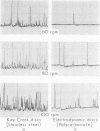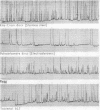Abstract
An ultrasonic transducer was used to detect gaseous microemboli during open heart surgery. When placed over the carotid artery of patients during surgery it was recognized that gaseous emboli were released into the systemic circulation following recognizable surgical procedures and from the oxygenator during bypass. Fixation of the transducer on the arterial return from the oxygenator demonstrated that the two types of disposable bubble oxygenators and disc oxygenators tested delivered microbubbles in the arterial blood. Some factors affecting the number of bubbles released were recognized and are discussed. Case reports of two patients who received large volumes of gaseous microemboli from different sources are presented.
Full text
PDF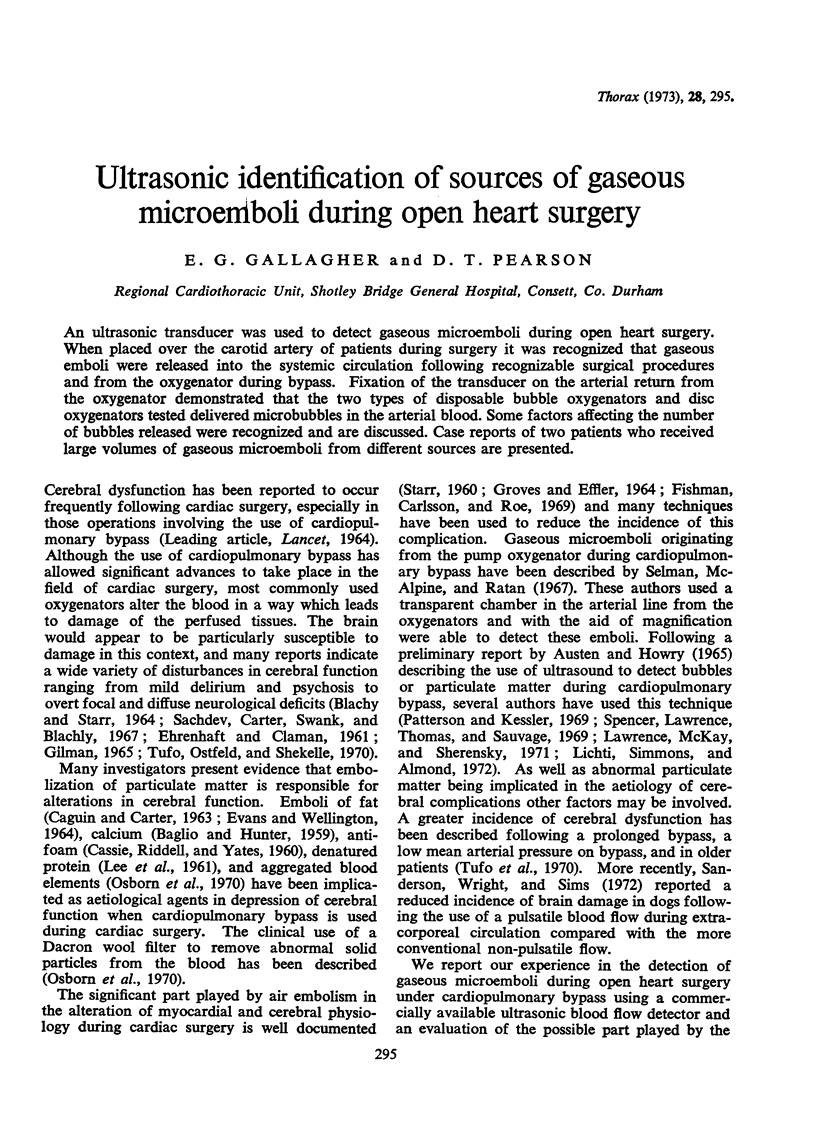
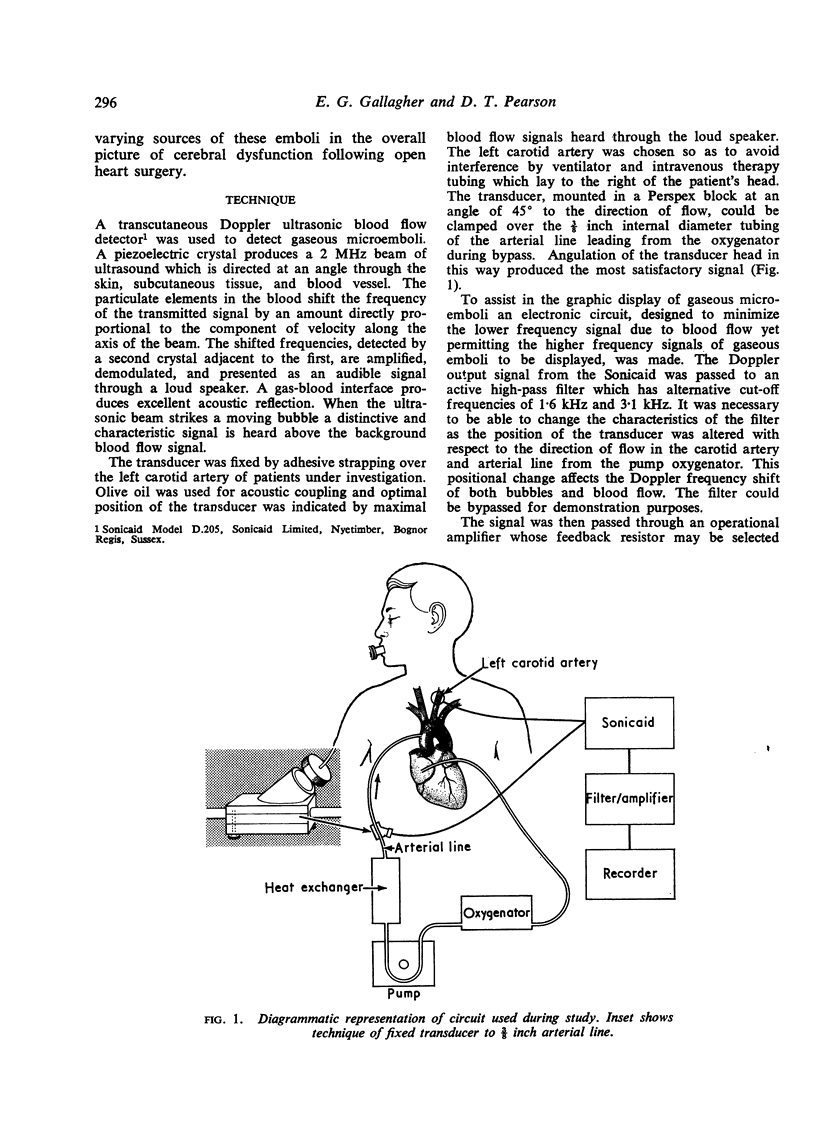
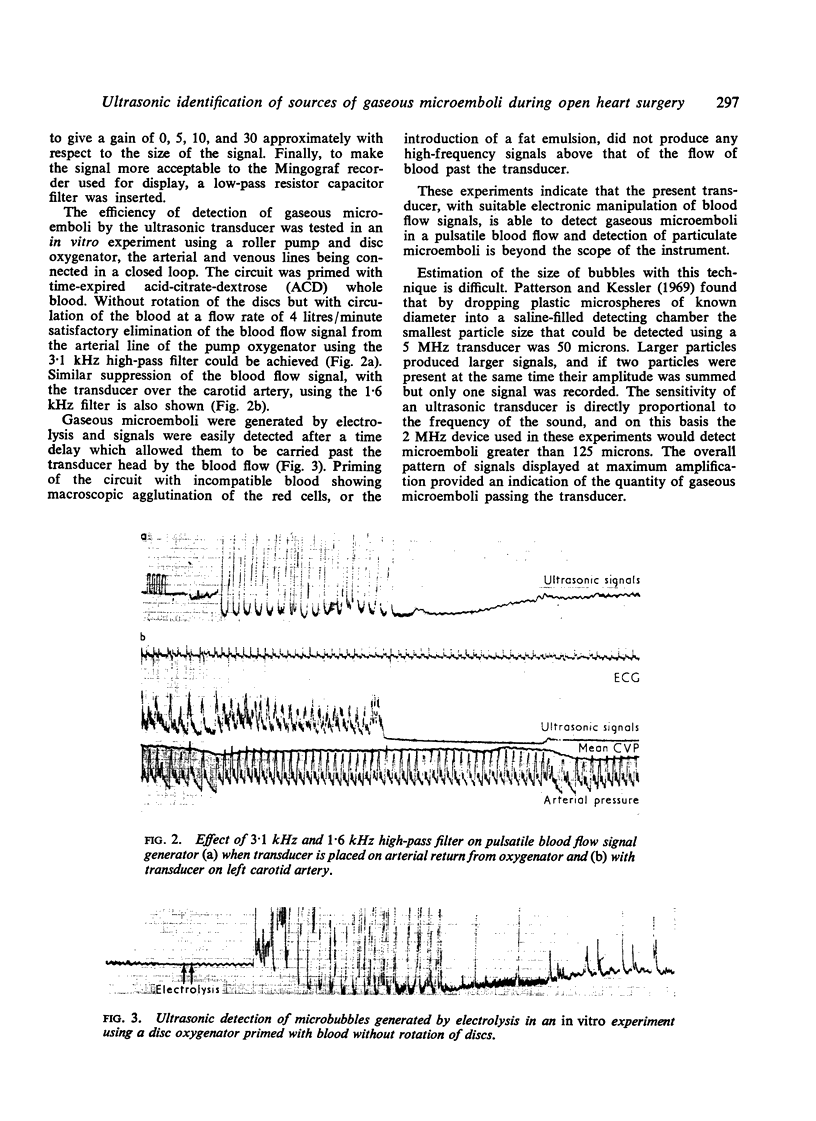
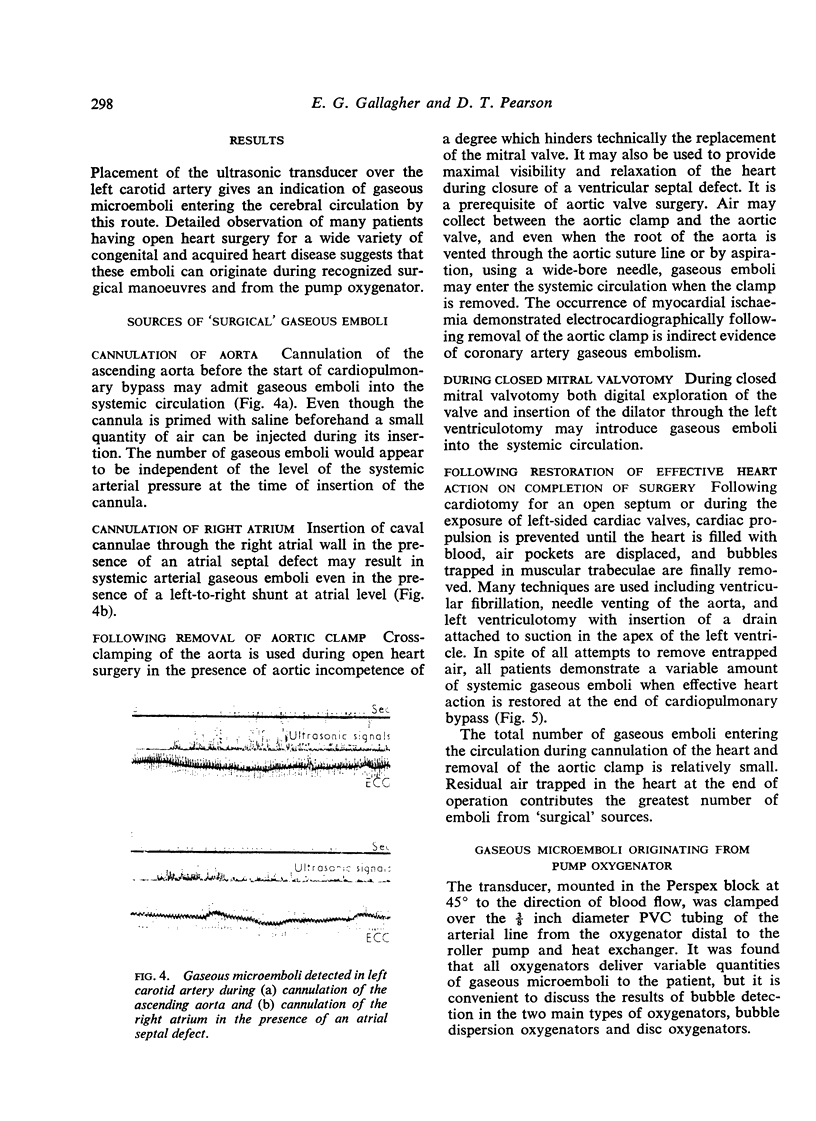
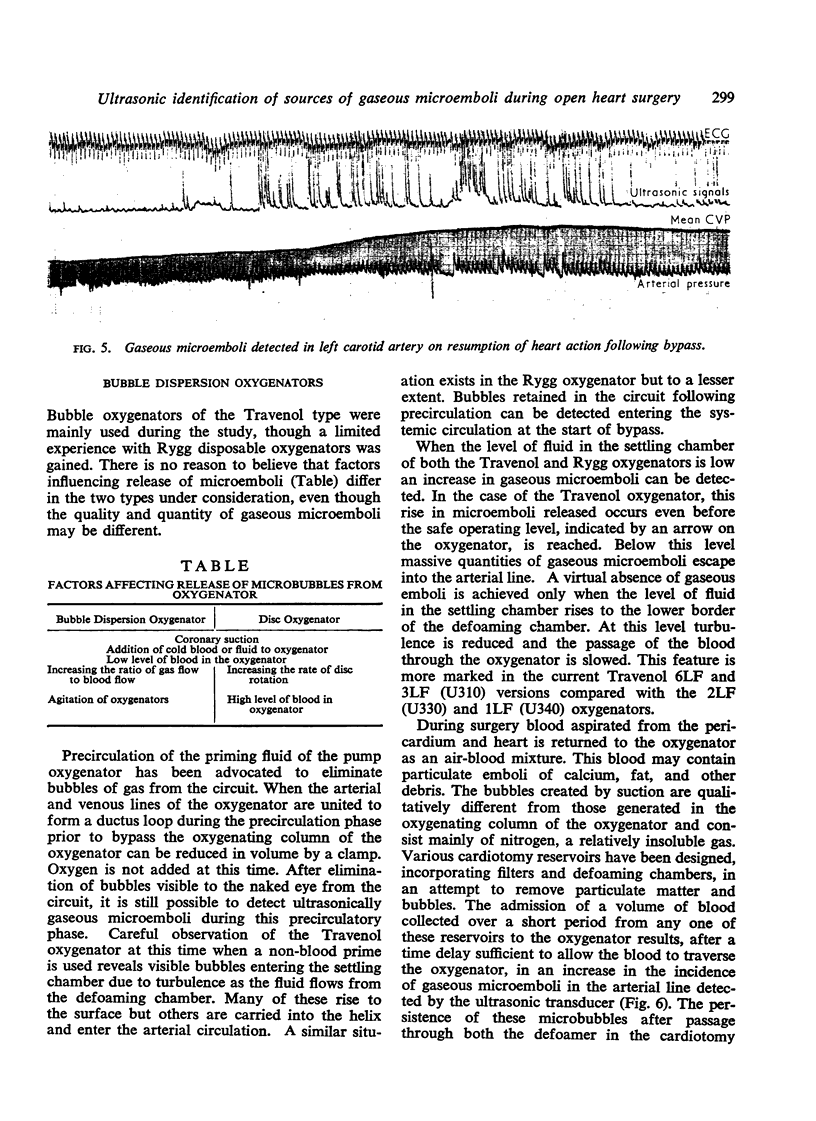
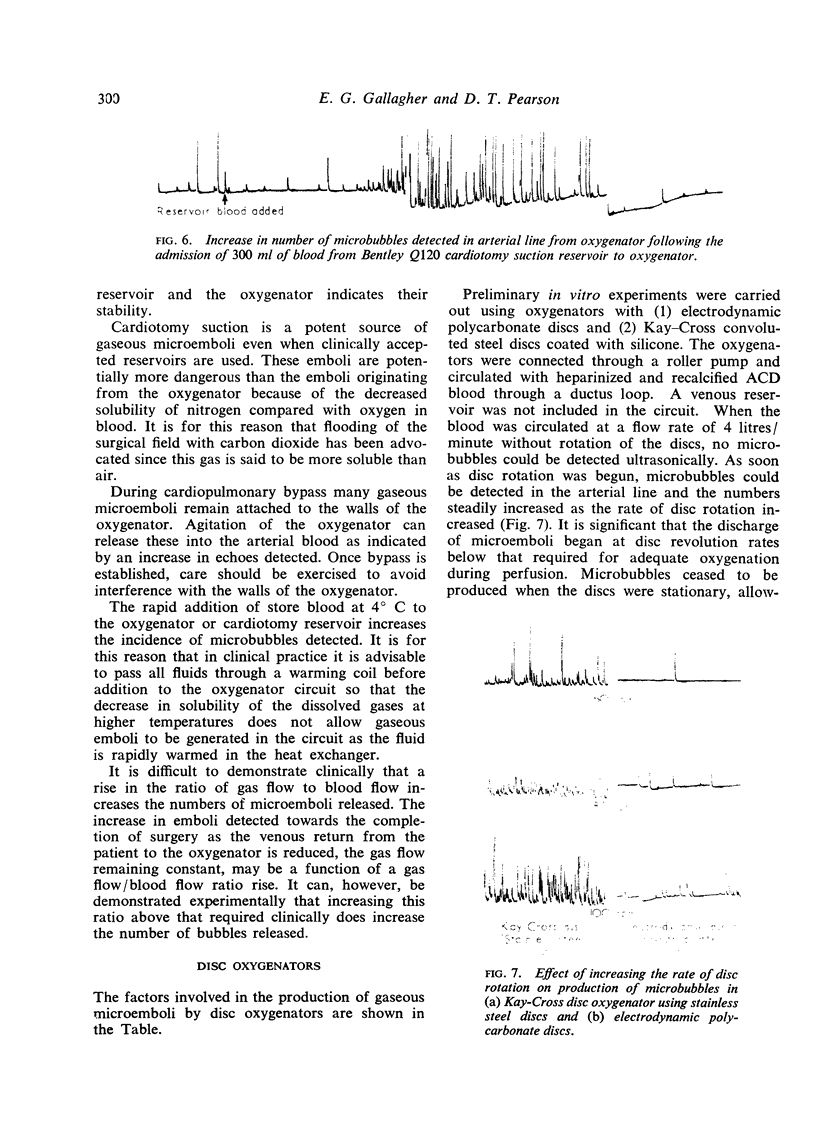
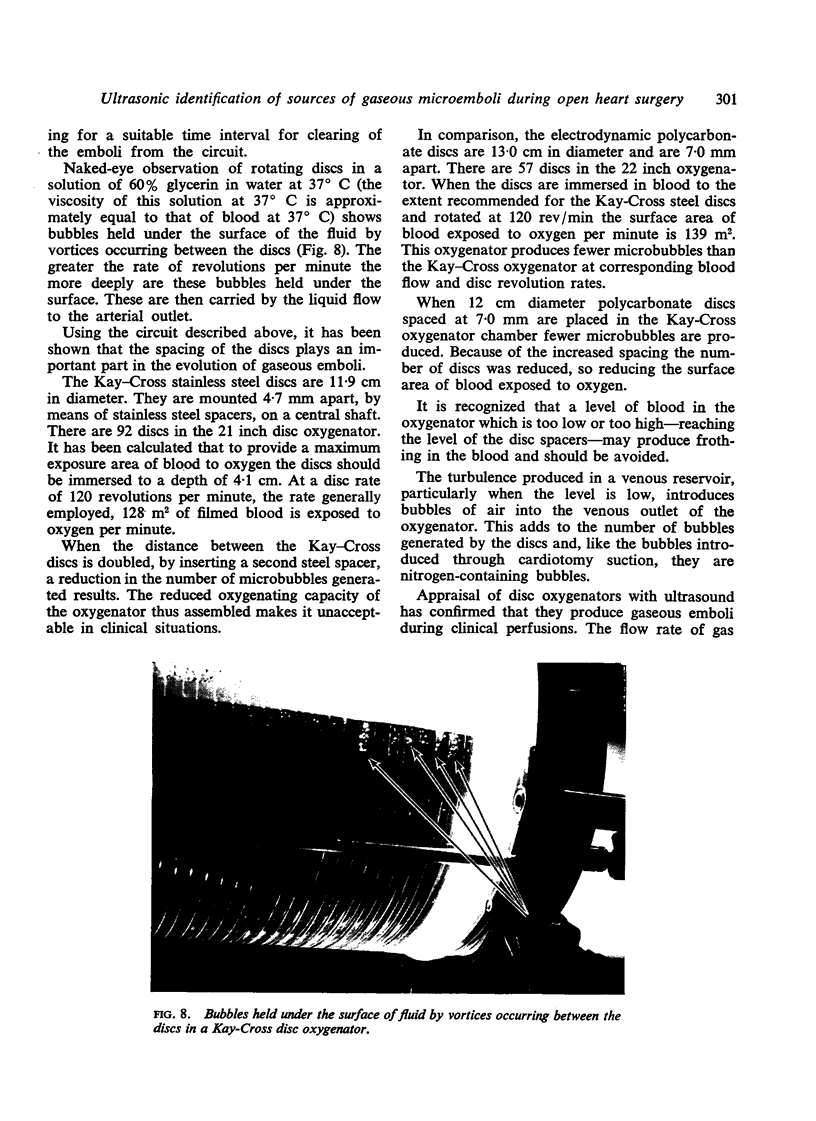
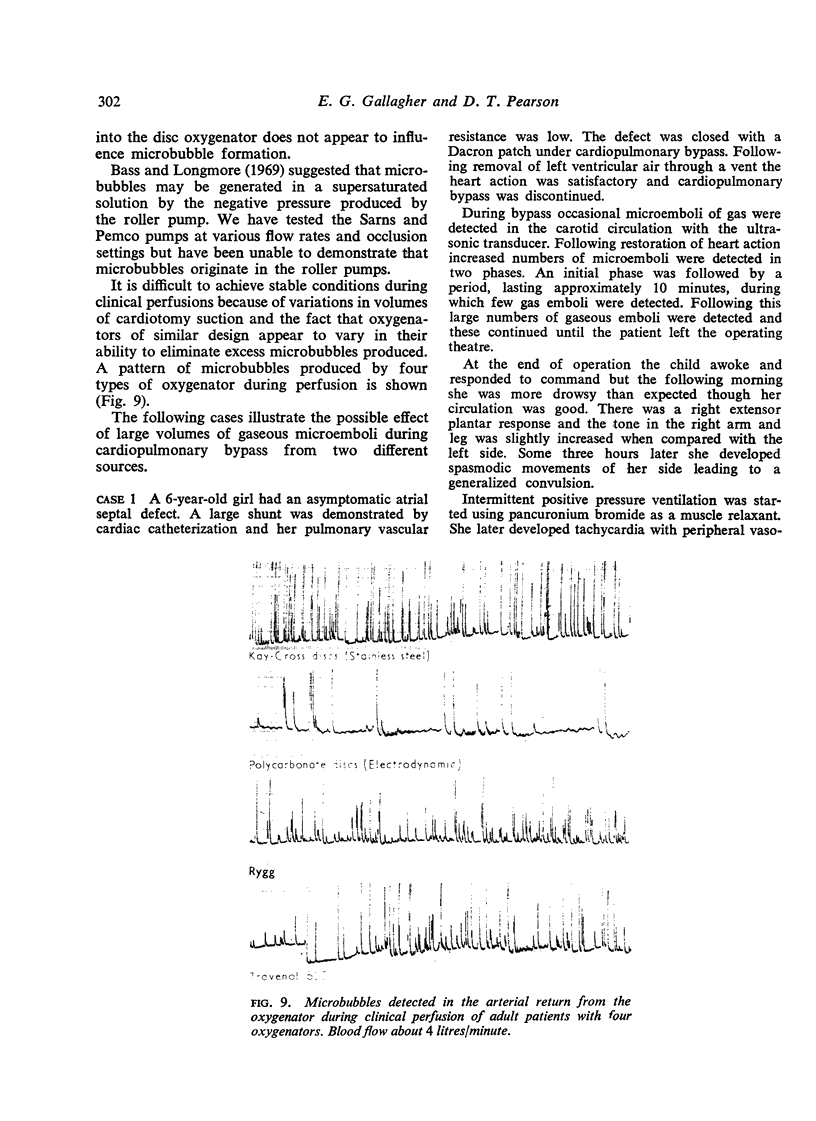
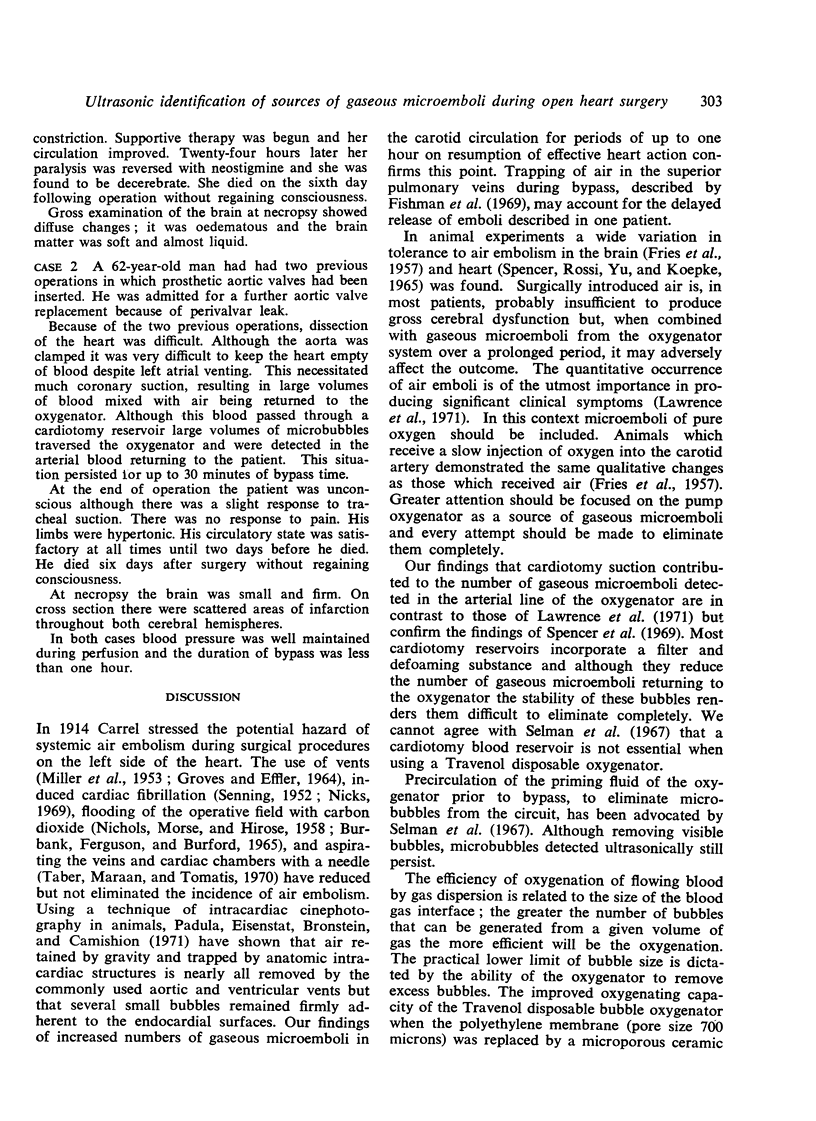
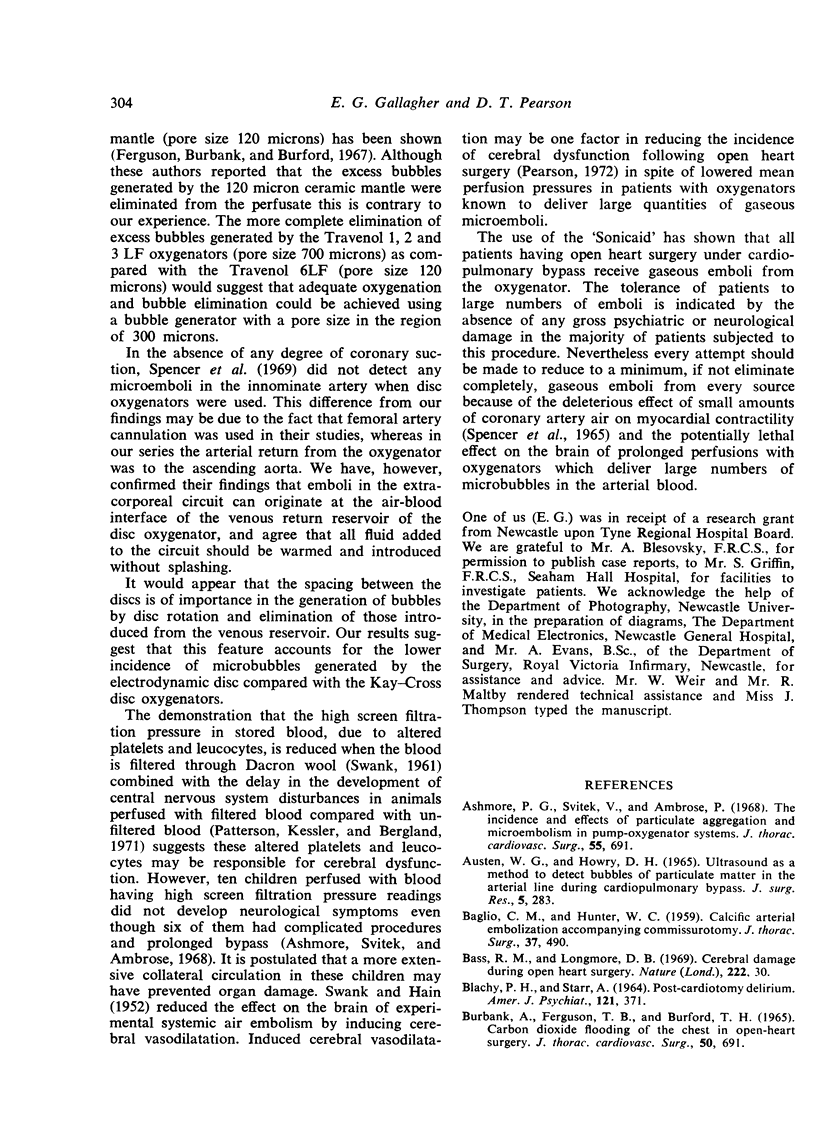
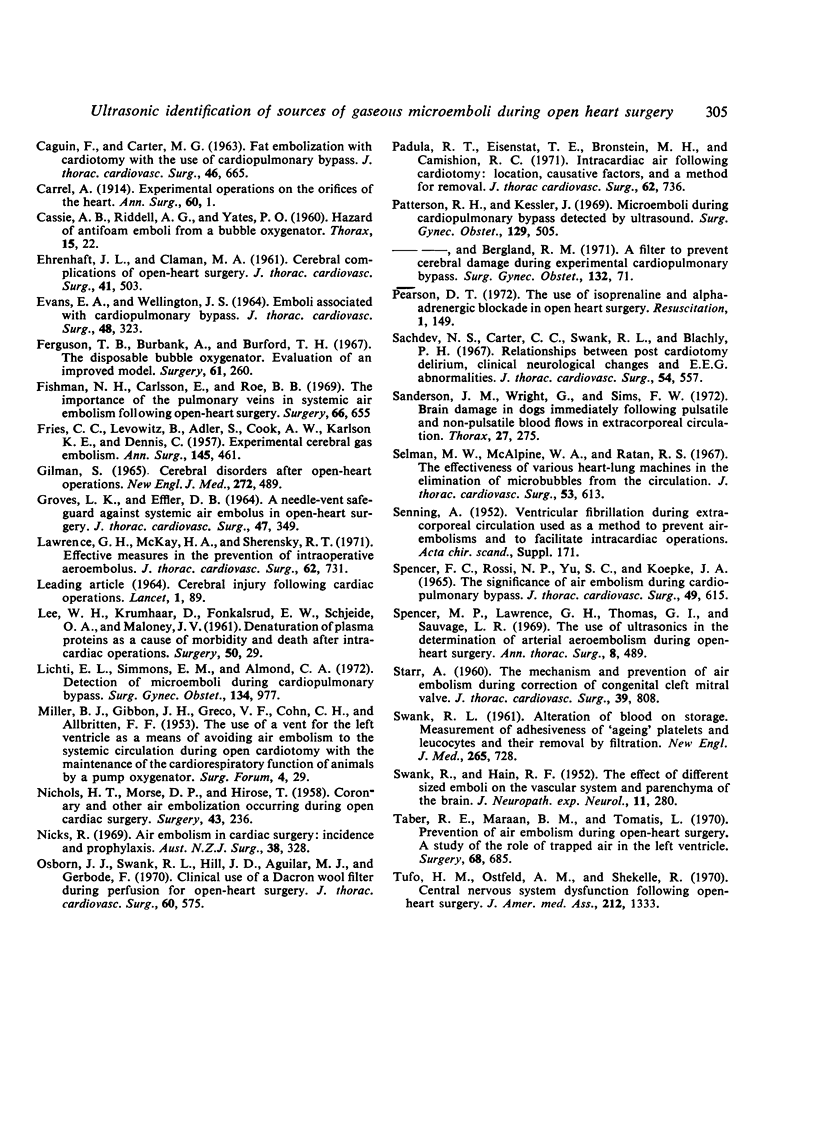
Images in this article
Selected References
These references are in PubMed. This may not be the complete list of references from this article.
- AUSTEN W. G., HOWRY D. H. ULTRASOUND AS A METHOD TO DETECT BUBBLES OR PARTICULATE MATTER IN THE ARTERIAL LINE DURING CARDIOPULMONARY BYPASS. J Surg Res. 1965 Jun;5:283–284. [PubMed] [Google Scholar]
- Ashmore P. G., Svitek V., Ambrose P. The incidence and effects of particulate aggregation and microembolism in pump-oxygenator systems. J Thorac Cardiovasc Surg. 1968 May;55(5):691–697. [PubMed] [Google Scholar]
- BAGLIO C. M., HUNTER W. C. Calcific arterial embolization accompanying commissurotomy; report of a proved case. J Thorac Surg. 1959 Apr;37(4):490–495. [PubMed] [Google Scholar]
- BLACHY P. H., STARR A. POST-CARDIOTOMY DELIRUM. Am J Psychiatry. 1964 Oct;121:371–375. doi: 10.1176/ajp.121.4.371. [DOI] [PubMed] [Google Scholar]
- Bass R. M., Longmore D. B. Cerebral damage during open heart surgery. Nature. 1969 Apr 5;222(5188):30–33. doi: 10.1038/222030a0. [DOI] [PubMed] [Google Scholar]
- Burbank A., Ferguson T. B., Burford T. H. Carbon dioxide flooding of the chest in open-heart surgery. A potential hazard. J Thorac Cardiovasc Surg. 1965 Nov;50(5):691–698. [PubMed] [Google Scholar]
- CAGUIN F., CARTER M. G. FAT EMBOLIZATION WITH CARDIOTOMY WITH THE USE OF CARDIOPULMONARY BYPASS. J Thorac Cardiovasc Surg. 1963 Nov;46:665–672. [PubMed] [Google Scholar]
- CASSIE A. B., RIDDELL A. G., YATES P. O. Hazard of antifoam emboli from a bubble oxygenator. Thorax. 1960 Mar;15:22–29. doi: 10.1136/thx.15.1.22. [DOI] [PMC free article] [PubMed] [Google Scholar]
- Carrel A. EXPERIMENTAL OPERATIONS ON THE ORIFICES OF THE HEART. Ann Surg. 1914 Jul;60(1):1–6. doi: 10.1097/00000658-191407000-00002. [DOI] [PMC free article] [PubMed] [Google Scholar]
- EHRENHAFT J. L., CLAMAN M. A. Cerebral complications of open-heart surgery. J Thorac Cardiovasc Surg. 1961 Apr;41:503–508. [PubMed] [Google Scholar]
- EVANS E. A., WELLINGTON J. S. EMBOLI ASSOCIATED WITH CARDIOPULMONARY BYPASS. J Thorac Cardiovasc Surg. 1964 Aug;48:323–330. [PubMed] [Google Scholar]
- FRIES C. C., LEVOWITZ B., ADLER S., COOK A. W., KARLSON K. E., DENNIS C. Experimental cerebral gas embolism. Ann Surg. 1957 Apr;145(4):461–470. doi: 10.1097/00000658-195704000-00002. [DOI] [PMC free article] [PubMed] [Google Scholar]
- Ferguson T. B., Burbank A., Burford T. H. The disposable bubble oxygenator. II. Evaluation of an improved model. Surgery. 1967 Feb;61(2):260–264. [PubMed] [Google Scholar]
- Fishman N. H., Carlsson E., Roe B. B. The importance of the pulmonary veins in systemic air embolism following open-heart surgery. Surgery. 1969 Oct;66(4):655–662. [PubMed] [Google Scholar]
- GILMAN S. CEREBRAL DISORDERS AFTER OPEN-HEART OPERATIONS. N Engl J Med. 1965 Mar 11;272:489–498. doi: 10.1056/NEJM196503112721001. [DOI] [PubMed] [Google Scholar]
- GROVES L. K., EFFLER D. B. A NEEDLE-VENT SAFEGUARD AGAINST SYSTEMIC AIR EMBOLUS IN OPEN-HEART SURGERY. J Thorac Cardiovasc Surg. 1964 Mar;47:349–355. [PubMed] [Google Scholar]
- LEE W. H., Jr, KRUMHAAR D., FONKALSRUD E. W., SCHJEIDE O. A., MALONEY J. V., Jr Denaturation of plasma proteins as a cause of morbidity and death after intracardiac operations. Surgery. 1961 Jul;50:29–39. [PubMed] [Google Scholar]
- Lawrence G. H., McKay H. A., Sherensky R. T. Effective measures in the prevention of intraoperative aeroembolus. J Thorac Cardiovasc Surg. 1971 Nov;62(5):731–735. [PubMed] [Google Scholar]
- Lichti E. L., Simmons E. M., Jr, Almond C. A. Detection of microemboli during cardiopulmonary bypass. Surg Gynecol Obstet. 1972 Jun;134(6):977–980. [PubMed] [Google Scholar]
- MILLER B. J., GIBBON J. H., Jr, GRECO V. F., COHN C. H., ALLBRITTEN F. F., Jr The use of a vent for the left ventricle as a means of avoiding air embolism to the systemic circulation during open cardiotomy with the maintenance of the cardiorespiratory function of animals by a pump oxygenator. Surg Forum. 1953 Oct;4:29–33. [PubMed] [Google Scholar]
- NICHOLS H. T., MORSE D. P., HIROSE T. Coronary and other air embolization occurring during open cardiac surgery; prevention by the use of gaseous carbon dioxide. Surgery. 1958 Feb;43(2):236–244. [PubMed] [Google Scholar]
- Nicks R. Air embolism in cardiac surgery: incidence and prophylaxis. Aust N Z J Surg. 1969 May;38(4):328–332. [PubMed] [Google Scholar]
- Osborn J. J., Swank R. L., Hill J. D., Aguilar M. J., Gerbode F. Clinical use of a dacron wool filter during perfusion for open-heart surgery. J Thorac Cardiovasc Surg. 1970 Oct;60(4):575–581. [PubMed] [Google Scholar]
- Padula R. T., Eisenstat T. E., Bronstein M. H., Camishion R. C. Intracardiac air following cardiotomy. Location, causative factors, and a method for removal. J Thorac Cardiovasc Surg. 1971 Nov;62(5):736–742. [PubMed] [Google Scholar]
- Patterson R. H., Jr, Kessler J. Microemboli during cardiopulmonary bypass detected by ultrasound. Surg Gynecol Obstet. 1969 Sep;129(3):505–510. [PubMed] [Google Scholar]
- Pearson D. T. The use of isoprenaline and alpha-adrenergic blockade in open heart surgery. Resuscitation. 1972 Jul;1(2):149–161. doi: 10.1016/0300-9572(72)90018-4. [DOI] [PubMed] [Google Scholar]
- SPENCER F. C., ROSSI N. P., YU S. C., KOEPKE J. A. THE SIGNIFICANCE OF AIR EMBOLISM DURING CARDIOPULMONARY BYPASS. J Thorac Cardiovasc Surg. 1965 Apr;49:615–634. [PubMed] [Google Scholar]
- STARR A. The mechanism and prevention of air embolism during correction of congenital cleft mitral valve. J Thorac Cardiovasc Surg. 1960 Jun;39:808–814. [PubMed] [Google Scholar]
- SWANK R. L. Alteration of blood on storage: measurement of adhesiveness of "aging" platelets and leukocytes and their removal by filtration. N Engl J Med. 1961 Oct 12;265:728–733. doi: 10.1056/NEJM196110122651503. [DOI] [PubMed] [Google Scholar]
- SWANK R. L., HAIN R. F. The effect of different sized emboli on the vascular system and parenchyma of the brain. J Neuropathol Exp Neurol. 1952 Jul;11(3):280–299. doi: 10.1097/00005072-195207000-00005. [DOI] [PubMed] [Google Scholar]
- Sachdev N. S., Carter C. C., Swank R. L., Blachly P. H. Relationship between post-cardiotomy delirium, clinical neurological changes, and EEG abnormalities. J Thorac Cardiovasc Surg. 1967 Oct;54(4):557–563. [PubMed] [Google Scholar]
- Sanderson J. M., Wright G., Sims F. W. Brain damage in dogs immediately following pulsatile and non-pulsatile blood flows in extracorporeal circulation. Thorax. 1972 May;27(3):275–286. doi: 10.1136/thx.27.3.275. [DOI] [PMC free article] [PubMed] [Google Scholar]
- Selman M. W., McAlpine W. A., Ratan R. S. The effectiveness of various heart-lung machines in the elimination of microbubbles from the circulation. J Thorac Cardiovasc Surg. 1967 May;53(5):613–617. [PubMed] [Google Scholar]
- Spencer M. P., Lawrence G. H., Thomas G. I., Sauvage L. R. The use of ultrasonics in the determination of arterial aeroembolism during open-heart surgery. Ann Thorac Surg. 1969 Dec;8(6):489–497. doi: 10.1016/s0003-4975(10)66085-7. [DOI] [PubMed] [Google Scholar]
- Taber R. E., Maraan B. M., Tomatis L. Prevention of air embolism during open-heart surgery: a study of the role of trapped air in the left ventricle. Surgery. 1970 Oct;68(4):685–691. [PubMed] [Google Scholar]
- Tufo H. M., Ostfeld A. M., Shekelle R. Central nervous system dysfunction following open-heart surgery. JAMA. 1970 May 25;212(8):1333–1340. [PubMed] [Google Scholar]








